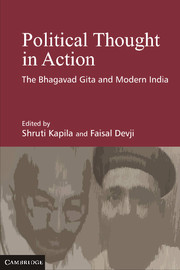Book contents
- Frontmatter
- Contents
- List of Contributors
- Acknowledgements
- Introduction
- 1 India, the Bhagavad Gita and the World
- 2 The Transnational Gita
- 3 The Transfiguration of Duty in Aurobindo's Essays on the Gita
- 4 Gandhi's Gita and Politics as Such
- 5 Gandhi on Democracy, Politics and the Ethics of Everyday Life
- 6 Morality in the Shadow of Politics
- 7 Ambedkar's Inheritances
- 8 Rethinking Knowledge with Action: V. D. Savarkar, the Bhagavad Gita and Histories of Warfare
- 9 A History of Violence
- Index
5 - Gandhi on Democracy, Politics and the Ethics of Everyday Life
Published online by Cambridge University Press: 05 January 2014
- Frontmatter
- Contents
- List of Contributors
- Acknowledgements
- Introduction
- 1 India, the Bhagavad Gita and the World
- 2 The Transnational Gita
- 3 The Transfiguration of Duty in Aurobindo's Essays on the Gita
- 4 Gandhi's Gita and Politics as Such
- 5 Gandhi on Democracy, Politics and the Ethics of Everyday Life
- 6 Morality in the Shadow of Politics
- 7 Ambedkar's Inheritances
- 8 Rethinking Knowledge with Action: V. D. Savarkar, the Bhagavad Gita and Histories of Warfare
- 9 A History of Violence
- Index
Summary
Gandhi had a complicated view of democracy. If we think of democracy as in some minimal sense it is commonly understood—as an interlinked set of institutional practices that feature regular elections, broad representation and a spectrum of individual rights, all of which are meant to give expression to the idea that individuals are free and equal and that the ultimate source of legitimate political power is the corporate body of the people, because it alone is deemed to be sovereign—then one must conclude that Gandhi was substantially unimpressed by democracy, though not always opposed to it. His writings are replete with comments critical of the idea of elections, representation and individual rights. In Hind Swaraj he famously characterized the British parliament as a “sterile woman and a prostitute,” and identified it as the cause of a long litany of British and modern woes. In that context he was explicit, “I pray that India may never be in that plight.” Gandhi similarly was not overly taken with the idea that individuals were naturally free or that they were naturally equals. In their common rendering these ideas are not of particular importance to him. Such claims embodied an abstractness that is antithetical to the basic tenor of his way of thinking. He certainly did not think that the special value of freedom lay in giving individuals a sense of their political power as citizens. He did occasionally speak of individual rights; nevertheless it was obligations, and not rights, that he emphasized.
- Type
- Chapter
- Information
- Political Thought in ActionThe Bhagavad Gita and Modern India, pp. 88 - 106Publisher: Cambridge University PressPrint publication year: 2013



